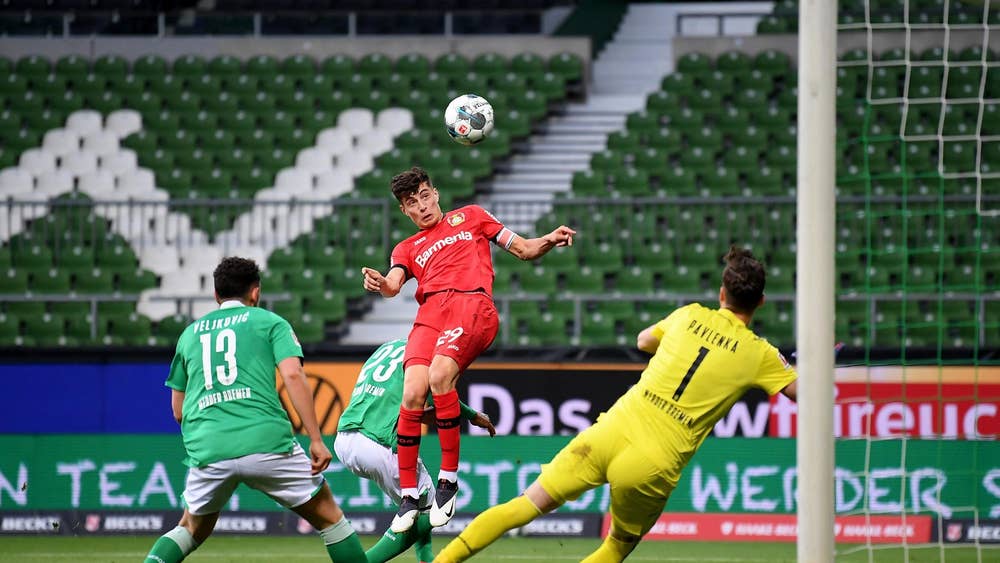" With no fans in the ground, there was no outpouring of emotion from the stands, no roar when the ball crossed the line and no pile-on of players due to social distancing measures.
Instead, Haaland's team-mates formed an arc around him from a short distance and applauded as he did a strange dance on his own in the corner. "

Four ways empty stadiums could affect Premier League's return
An end to home advantage, more young players and weird celebrations – are these among the things we can expect to see in the Premier League when it restarts inside empty stadiums?
The past two weeks of Bundesliga action have given us an insight into how the game has been affected behind closed doors in Germany.
And there have been benefits, as well as disadvantages, to playing without fans.
Here are a few things we have noticed that could have an impact on the Premier League.
An end to home advantage?
Is there any advantage still to be had when you don’t have the support of your fans in the stadium and it’s no longer intimidating for the opponents?
The past two weeks of the Bundesliga suggest that could be the case. Only three wins have been picked up at home in 22 matches. And more goals have been scored by the away teams too (44 compared to 25.)
Borussia Dortmund hoped for some home advantage in their top-of-the-table match with Bayern Munich on Tuesday but it was the league leaders who pulled away even further with a 1-0 win. And visitors Wolfsburg thrashed Bayer Leverkusen, who started the day fourth, 4-1 on the same night.
Borussia Monchengladbach scored their fastest Bundesliga goal in five years (37 seconds) in a 3-1 win at Frankfurt and Mainz avoided an away defeat after trailing by at least two goals for the first time since 2017 when they came back to draw 2-2 at Cologne.
Mainz also lost a Bundesliga match by a score of 5-0 for the first time in their history in the next home game against RB Leipzig, while Augsburg registered their biggest away win in the league since October 2017 against Schalke.
Several Premier League clubs believe that, even without fans, there is an advantage to be had by playing at home, rather than at neutral venues, as has been discussed.
Watford chairman Scott Duxbury said on 9 May that playing games away from Vicarage Road would cost them “the familiarity and advantage” that home matches provide.
But, so far at least, home teams are the ones suffering in the Bundesliga.
Weird celebrations
Some things were exactly the same as Dortmund and Schalke took centre stage in the early kick-off on 16 May – Erling Braut Haaland scoring, for example.
His goal in the 29th minute set Dortmund on their way to a comfortable 4-0 victory in front of an empty Westfalenstadion.
But the celebrations were definitely different.
Hertha Berlin forward Vedad Ibisevic, who celebrated with team-mates during their 3-0 win at Hoffenheim, said footballers are “not robots” and have to be “passionate”.
But Freiburg keeper Alexander Schwolow pointed out an advantage to the lack of fans.
“Football lives off fans and the people we can excite,” said Schwolow following their 1-1 draw with RB Leipzig. “But on the pitch we communicated more because we can hear each other better.”
Less pressure on referees
You might think the absence of vociferous, partisan fans would mean a calmer atmosphere and that referees would need to show fewer yellow and red cards.
But it seems little has changed on that front in the Bundesliga.
There were 24 bookings given on the first weekend after the restart, while 25 were shown this weekend.
That follows the pattern from the previous five gameweeks, in which an average of 24 yellow cards had been given.
There were no red cards shown on the first weekend but two players were given their marching orders this weekend – Felix Klaus in Wolfsburg’s defeat by Borussia Dortmund and Philipp Bargfrede in Werder Bremen’s victory over Freiburg.
That was just the fourth time in the past 12 gameweeks that more than one red card had been shown.
While it appears refereeing decisions have not been impacted, Match of the Day pundit Gary Lineker says there is “considerably more playing time” as the players have not been encouraged to waste time and play-act by supporters.
A chance for young players to thrive
The Bundesliga is renowned for showcasing some of Europe’s top young talent and the past two weekends have been no different.
Dortmund’s 19-year-old striker Haaland and Bayer Leverkusen’s Kai Havertz, 20, have stolen headlines with their goalscoring form of late.
But are there benefits to not having any fans in the stadium for other youngsters hoping to break through?
No verbal abuse from opposition fans and not having to worry about the “occasion” presents an opportunity for young debutants to flourish with reduced pressure.
Florian Wirtz made history in a 4-1 win over Werder Bremen last Monday when he became Bayer Leverkusen’s youngest Bundesliga player (17 years, 15 days) – the third youngest overall in the competition.
So will we see more of the Premier League’s youngsters given a chance?
Original article 27.05.20 on the BBC Sport website.
To view the original article click here
© The Fan Experience Company 2020
